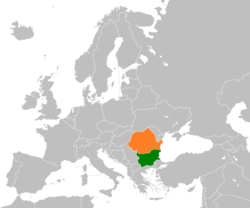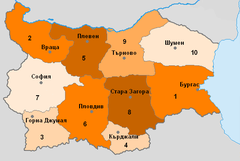User:Jack Jackie Pomi/sandbox
| 1938-40 Balkan Wars | ||||||||||
|---|---|---|---|---|---|---|---|---|---|---|
| Part of Balkan Wars | ||||||||||
 | ||||||||||
| ||||||||||
| Belligerents | ||||||||||
|
1938-39 invasions: |
Third war:
|
Fourth war: | ||||||||
| Casualties and losses | ||||||||||
|
1938-39 invasions: 20,000 |
Third war: 64,000 |
Fourth war: 45,000 | ||||||||
(Based on Hearts of Iron IV game)
Balkan Wars of 1938-1940 were several military conflicts between different Balkan countries, Italy and Soviet Union. They started on April 16, 1938, when Romania, aiming to dominate the Balkans, invaded Bulgaria. On May 6, Bulgaria surrendered and a puppet government was established. On September 2, Romania invaded Hungary, establishing another puppet government. On June 5, the so-called Balkan Union invaded Yugoslavia and then Greece, starting Third Balkan War. However, the Soviet Union broke in and invasion failed. Puppet governments were overthrown and Romania surrendered on July 9. Meanwhile, Italy also invaded Yugoslavia and took Slovenia and Dalmatia. On December 12, Italy again invaded Yugoslavia, but four other countries (Greece, Hungary, Bulgaria and Albania) sided with the defender and this turned into Fourth Balkan War. It ended with coalition victory on January 19, 1940. Yugoslavia gained Zadar and Istria.
- Organisation of the Bucharest Treaty of Collective DefenseBalkan Union
1938–1939  Romania an Bulgaria, leading countries of the union
Romania an Bulgaria, leading countries of the unionType System of puppets control under a form of military alliance Membership  Kingdom of Romania
Kingdom of Romania Hungary
Hungary Bulgaria
BulgariaLeaders • Chairman of Supreme Military Coordination CouncilIon Antonescu History • Treaty signed24 May 1938 • Hungary joins30 September 1938 • Third Balkan War begins5 June 1939 • Hungary leaves1 July 1939 • Bulgaria leaves5 July 1939 • Surrender of Romania9 July 1939 • Formally abolished12 August 1939
Organisation of the Bucharest Treaty of Collective Defense, informally known as Balkan Union, was an aggressive Romanian-dominated military union that existed from May 1938 to August 1939 and initiated Third Balkan War. Althrough nominally a defensive union, it was effectively a puppet control system created by Romanian prime minister Ion Antonescu.
The Bucharest Treaty of Collective Defense, which established the union, was signed between Romania and its puppet state Bulgaria (which was invaded by former during May 1938) on 24 May 1938. The treaty formally legalised the presence of Romanian army in Bulgaria and declared a mutual military assistance between the countries. The main body of collective defense decisions was Supreme Military Coordination Council, which consisted of Antonescu (as a bloc leader) as well as heads of state and ministers of defence of other countries.
In September 1938 Romania invaded Hungary. Because this was an aggressive war, Bulgaria neither didn't nor had to join the war. On 30 September 1938 new Romanian-backed Hungarian government joined the treaty. The pact released a joint statement on 15 December 1938 that they consider themselves "policemen" of Balkans. This implied that the pact could intervene anywhere in the Balkans at their will to redefine the borders or countries. Tensions began with Yugoslavia, on which' territories all pact members had claims. The crisis worsened during the spring of 1939, after negotiations with Yugoslavia broke down.
The crisis culminated in Third Balkan War, which began on 5 June 1939. The pact described it as "the war against an artificial state". Bulgaria also invaded Greece three days later. Initially successful, the attacks abruptly ended on 18 June, after the Soviet Union joined the anti-Romanian coalition. After numerous setbacks, all fronts collapsed for the pact and Hungary and Bulgaria one by one overthrew their puppet governments and declared that their participation is over. Romanian, being alone, finally surrendered on 9 July 1939, effectively ending the pact's existence. The formal dissolution of the pact took place on 12 August 1939, when Ljubljana Peace Treaty was signed.
- Tsardom of BulgariaЦарство България
1938–1939 Motto: Съединението прави силата
Saedinenieto pravi silata
("Unity makes strength")Anthem: Шуми Марица
Shumi Maritsa
Maritsa Rushes
(1886–1946) Map of Bulgaria in 1935
Map of Bulgaria in 1935Status Puppet state of Romania Capital Sofia Common languages Bulgarian Religion Bulgarian Orthodox Church (state religion) Demonym(s) Bulgarian Government Unitary parliamentary constitutional monarchy under foreign military occupation Tsar • 1938—1939Boris III Romanian governor • 1938—1939Horia Sima Chairman of the Council of Ministers • 1938—1939Kimon Georgiev Legislature National Assembly (suspended) Historical era Interwar period • Romanian military occupation6 May 1938 • Puppet government established21 May 1938 • Entry into TBW5 June 1939 • Puppet government dissolved5 July 1939 • Ljubljana Peace Treaty12 August 1939 Area 1935 122,134 km2 (47,156 sq mi) Population • 19354,580,000 Currency lev Preceded by Succeeded by 
Kingdom of Bulgaria Kingdom of Bulgaria 
Bulgarian Kingdom was under Romanian occupation from May 1938 to July 1939. The occupation began after Romanian invasion during April 16—May 6 1938. After an unsuccessful attempt to confront agreesion, Bulgaria was forced to sign an armistice with Romania, beginning the period of military occupation. On May 21, a new, Romanian-backed government with Kimon Georgiev in charge was installed. Romania also established the post of military governor to control the occupation. Horia Sima was appointed as one. Tsar Boris III retained his position, as well as other Bulgarian institutions, except National Assembly, which was dissolved on May 23 by joint decision of new government, Boris III and Romania.
During the year 1939 Bulgaria fought in the disasterous Third Balkan War. It began with joint invasion of Kingdom of Yugoslavia by Romania. Bulgaria and Hungary on 5 June 1939. On 9 June Bulgaria also began invasion of Greece. Initially successful, these invasions stalled after Soviet Union invaded Romania on 18 June 1939. This led to a subsequent defeat in Greece in Yugoslavia. Anti-war sentiment in Bulgaria grew and on 5 July 1939 Boris III dissolved Georgiev cabinet and reinstalled Georgi Kyoseivanov as a prime minister of Bulgaria. The same day, he deposed Horia Sima and declared war on Romania, which was alone by this point. On 9 July, Romania surrendered, ending the war. Bulgaria later participated in Ljubljana Peace talks and was a side in Ljubljana Peace Treaty signed on 12 August 1939. The peace treaty formally abolished all occupation institutions and returned Southern Dobruja to Bulgaria.
Third Balkan War Part of Balkan Wars 
Date June 5 — July 9, 1939 (1 month and 4 days) Location Balkan PeninsulaResult Anti-Romanian coalition victory:
- Ljubljana Peace Treaty
Territorial
changes- Romania partitioned between Hungary, Bulgaria and Soviet Union, thus returning to it's 1912 borders.
- Occupation of Romania until July 1940.
- Slovenia and Dalmatia ceded to Italy.
Belligerents Balkan Union:[1]
 Kingdom of Romania
Kingdom of Romania Hungary (until July 1)
Hungary (until July 1) Bulgaria (until July 5)
Supported by:
Bulgaria (until July 5)
Supported by:Anti-Romanian coalition:
 Kingdom of Yugoslavia
Kingdom of Yugoslavia Kingdom of Greece (since June 8)
Kingdom of Greece (since June 8) Soviet Union (since June 18)
Supported by:
Soviet Union (since June 18)
Supported by: Kingdom of Italy (since June 10)
Kingdom of Italy (since June 10)Commanders and leaders Strength - 500,000 personnel
- 800,000 personnel
- 200,000 personnel
Casualties and losses 35,000 25,000 4,000 - ^ All members of this union were puppets of Romania
Third Balkan War (Romanian: Al Treilea Război Balcanic, Serbian: Трећи балкански рат, Template:Lang-bg), or June War (Greek: Ιούνιος Πόλεμος) was a military conflict between Romania-led Balkan Union and Anti-Romanian coalition of Yugoslavia, Greece and later the Soviet Union. Italy also participated in the war, invading Yugoslavia on June 10.
The war began on June 5, 1939, after Romania and its satellites Hungary and Bulgaria, aiming to dominate the Balkans, invaded Yugoslavia. Four days later they also invaded Greece and quickly took over much of Yugoslavian territories, including Macedonia, Vojvodina and Slovenia. On June 10, Italy started its own invasion of Yugoslavia, occupying Montenegro, Dalmatia and later Slovenia (transferred from Hungarian control).
Yugoslavia began talks with Soviet Union in order to call them into war. On June 18, Soviet army crossed the border with Romania. The front quickly collapsed as Soviet and Greek armies began their attack on Bulgaria and Romania. Meanwhile, Italy ended its invasion, annexing all controlled territories. Meanwhile, Balkan Union began to collapse. On July 1, Hungarian army overthrew puppet government and declared war on Romania, occupying Transylvania. Bulgaria surrendered on July, 5. Finally, Romania surrendered on July 9, ending the war.
After the end, peace talks began in Ljubljana in order to resolve all territorial claims. On August 12, Ljubljana Peace Treaty was signed. Romanian territory was partitioned: Transylvania ceded to Hungary, Bessarabia to Soviet Union and Northern Dobrujia to Bulgaria. Italy gained Slovenia and Dalmatia, while Montenegro was returned to Yugoslavia. Greece' territories were unchanged.
Fourth Balkan War Part of Balkan Wars 
Date December 12, 1939 — January 19, 1940 (1 month and 1 week) Location Western BalkansResult Balkan coalition victory:
- Second Ljubljana Peace Treaty
Territorial
changes- Yugoslavia returns territory lost in the previous war and gains Zadar and Istria
- Albania gains independence
Belligerents Supported by:Balkan coalition:
 Kingdom of Yugoslavia
Kingdom of Yugoslavia Kingdom of Greece (since December 14)
Kingdom of Greece (since December 14) Hungary (since December 16)
Hungary (since December 16) Albania (since December 18)
Albania (since December 18) Bulgaria (since January 4)
Supported by:
Bulgaria (since January 4)
Supported by:Commanders and leaders Strength - 250,000 personnel
- 300,000 personnel
Casualties and losses 30,000 15,000





